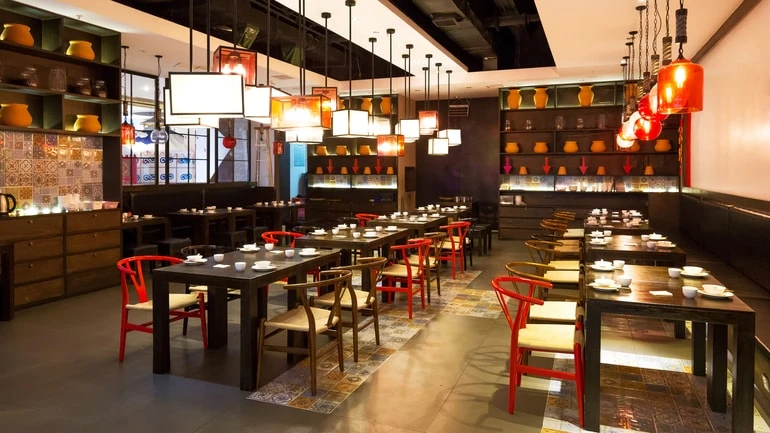Opening a restaurant is challenging. Striking the right combination of location, concept, staff, and finances to succeed in the industry is a difficult endeavor. However, when all of these elements align and you finally have a booming business, you may start thinking about expansion.
There are several ways to grow your restaurant from one venue into an empire. Today we’re focusing on how you can expand into a restaurant group.
We’re sharing advice from experts who spoke at The Industry Sessions in Houston – a TouchBistro powered series on How to Build a Restaurant Empire. In this article, you’ll get input from talented entrepreneurs like Justin Yu of Theodore Rex, Tracy Vaught of H-Town Restaurant Group, Leonora Varvoutis and Christina Ramey of Agricole Hospitality, and Chris Shepherd and Victoria Dearmond of Underbelly Hospitality.
In this guide to expanding into a restaurant group, you’ll learn:
- What a restaurant group is
- The benefits of operating multiple restaurants within one group and the challenges
- How to use systems and technology around multiple venues
- When to expand into a restaurant group
- Words of wisdom from our panelists
What Are Restaurant Groups?
Restaurant groups and restaurant chains often get confused.
A restaurant group consists of different concepts under one umbrella. For example, Houston restaurant group H-Town is made up of concepts like Oaxacan restaurant Xochi, Caracol (which serves Mexican coastal food), and Backstreet Cafe (which has a New American menu).
A chain, on the other hand, replicates the same concept in multiple locations. Justin Yu of Theodore Rex explains that chains “take things that are really, really successful and just recreates that over and over again,” he says. “They go from city to city, as opposed to being based specifically out of one area.” Think TGI Friday’s or Chipotle.
Restaurant groups often have different structures than single venue restaurants and therefore have both corporate roles and venue roles.
Venue roles are the same as the ones you would have in any restaurant: front-of-house and back-of-house staff like chefs, cooks, servers, hosts, managers, etc. This is your boots-on-the-ground staff. These roles usually work exclusively for one venue.
On the other side, corporate roles serve all of the restaurants in the group. Most corporate roles focus on business operations: HR, marketing, business strategy, accounting, etc. While some of these functions are carried out in-house, others are carried out by consultants who are hired on retainer.
Some restaurant groups also have food positions at the corporate level, like executive chef, executive pastry chef, and director of beverage.

The Benefits of Operating Multiple Restaurants within One Group
While running a restaurant group is complicated, the endeavor has many upsides.
1) Corporate roles streamline operations
Corporate roles for HR, payroll, accounting, legal, etc. make operations more efficient. Your needs for administrative roles like these increase as you open more restaurants. Eventually, you’ll need to bring these roles in-house instead of outsourcing or having experts on retainer.
When you transition from using consultants to building your in-house corporate team, you’ll get better results from your team because they’ll be focused solely on your business’ needs rather than having to juggle multiple clients.
Attracting and retaining talent becomes easier
With an annual staff turnover rate of 73%, the restaurant industry struggles to retain employees. A lack of professional development opportunities is a reason that employees point to when leaving a restaurant.
When you own multiple restaurants, the opportunities for professional development for your team are endless. The best restaurant groups to work for do whatever they can to retain their top talent. Chris Shepherd of Underbelly Hospitality says, “to keep people inspired, you may [need to] give them a new job.”
Justin Yu does this by letting his team move around his restaurants. “What we’ll do [for staff looking for new opportunities] is do a set amount of time at a certain location, and offer them the chance to have a different experience between a different bar, or move from a bar setting to a restaurant setting, or cook a different style of food, and with a different pace of food,” he says. “As a restaurant group, you have the opportunity to do that all in one place, as opposed to trying to not lose them to another property.”
Restaurant groups may suffer from less turnover than single venue restaurants because they can offer their employees a variety of professional development opportunities.
Sense of community
When you own multiple restaurants and operate under one brand, it’s easier to foster a sense of community and build a team culture. Culture makes staff happier, and ultimately prevents turnover.
How do the best restaurant groups build culture and community? By rallying around a core set of values. Tracy Vaught shared that H-Town Restaurant Group’s values are “mentorship, leadership, and ethics.” She says that culture stems from how you treat your staff. “If you treat your employees well, then they will also treat the business well.”
Increased marketing opportunities
When you operate multiple restaurants, you have the opportunity to cross-promote your restaurants to multiple audiences by sharing email lists across the group or hanging posters up about promotions at your other venues in each restaurant.

The Challenges of Running Restaurant Groups
While running a restaurant group is rewarding, it’s not without its challenges. Here are some of the obstacles you’ll face.
Giving up control
To successfully run several restaurants, you’ll need to learn how to delegate. Restaurateurs often become the CEOs of their restaurant group and therefore have to focus on high-level projects like growing the business, rather than doing the day-to-day tasks they once enjoyed.
Giving up control can be difficult for entrepreneurs, says Underbelly Hospitality’s Chris Shepherd, but it creates opportunities for others.
“If you don’t delegate, you’ll never be able to grow,” he says. “You want to do the things that you know you can do, but you should actually delegate them so that people have the opportunity to learn from you. If not, then you’re always going to continue to do [those tasks] and these people don’t get the opportunity to grow and expand.”
Want to have the best restaurant group in your city? Master the art of delegation.
More concepts, more problems
Unlike franchises or chains in which every concept is the same, restaurant groups are made up of different concepts. Each concept has its own set of challenges.
While some operations get streamlined by having corporate roles, operating a restaurant group doesn’t drastically reduce the workload at hand. If your restaurant group consists of five restaurants, it will still feel like you’re running five different restaurants.
Can’t share hourly employees
While it may seem like you could use all of your employees at your different venues once you multiple restaurants, this is actually tricky to execute when it comes to hourly employees and therefore isn’t usually done.
Tracy Vaught explains that H-Town Restaurant Group’s restaurants don’t share hourly workers because payroll is done separately at each venue, so calculating overtime for employees working at multiple venues would be far too complicated to do on a regular basis.
Communication across restaurants
Miscommunication becomes inevitable when you work with many people across many restaurants – and you can’t be at every location every day. A message might not make it to one restaurant, so staff could miss an important announcement or even a delivery.
The best restaurant groups to work for have systems and technology in place to facilitate communication across all venues and avoid errors.

How to Use Systems and Technology with Multiple Venues
Modern restaurants can’t run efficiently without streamlined systems and the latest technology. When running multiple restaurants, should you replicate the same processes at all of your venues and install all of the same tech tools in your restaurants, or should you individualize solutions to each venue? Houston restaurant group operators have differing perspectives on this question.
Leonora Varvoutis of Agricole Hospitality believes that technology should be customized to each concept’s unique needs. “Not everybody uses the same knife, not everybody uses the same wine key,” she says. “Why is technology any different?”
Other restaurateurs, like Tracy Vaught of H-Town Restaurant Group, believe that keeping things uniform increases efficiency. “We have the same POS [across restaurants]. We have the same reservation system. We have the same accounting software,” she says.
There’s also a middle ground. Justin Yu of Theodore Rex says that it’s important to use the same base technologies and systems throughout your restaurants but to be flexible with the details, understanding that every venue is unique.
When’s the Right Time to Expand?
How do you know when it’s the right time to grow your restaurant empire by forming a restaurant group? Here are three key indicators from the panelists.
1) Your restaurant is making a profit
You don’t want to start expanding if you’re still struggling to pay all your bills and make payroll each month. “If you can’t make the money in the first place, the struggle is twice as hard [when you expand],” says Justin Yu.
Make sure your current restaurant is thriving financially before you open new concepts. Having profits to work from will help you have the cash to expand. While loans are a viable option, taking on debt this early on will give you less flexibility if you need to borrow funds in the future for unexpected expenses.
2) You no longer feel challenged
If you feel like you’re running your restaurant on autopilot, it might be time to challenge yourself creatively by growing the business.
“Are you starting to get bored?” That’s a question Justin Yu suggests restaurateurs ask themselves before expanding. “Do you feel as if there [are] more challenges that you really want to start taking on?”
If you answered yes to either of those questions, then chances are that you need more creative challenges, and opening more restaurants could satisfy that need.
You have a reliable team
Finding experienced staff that you can count on is one of the biggest challenges in the restaurant industry. Staff shortages are prevalent and turnover is at an all-time high.
When you’ve got a steady team who you can rely on, you’ll be better equipped to let them run your original restaurant as you work to build a new one, or grow the business in other ways. And when you open up your new shop, you will be able to count on these team members to train newcomers and help you run the best restaurant group possible.

Advice for restaurateurs looking to expand into restaurant groups
There’s a lot to consider before expanding your business from one restaurant into multiple as a restaurant group. Here’s some final food for thought from our expert panelists from our Houston Industry Session on business expansion:
- “The number one thing that restaurant owners should keep in mind before they start to expand is you’re going to have to realize you can’t be everywhere at every time. And so, you have to have the crew around you, the staff around you, the people that care. Having a good team is really the key.” – Chris Shepherd of Underbelly Hospitality
- “Always find yourself a partner [who] has the same values as you.” – Justin Yu of Theodore Rex
- “Make sure that the restaurants that you have [already] are being very well run. The training programs are up to date, the menu descriptions and the pricing – everything is totally the way you want it so that you can step away for those few months in the beginning and not suffer.” – Tracy Vaught of H-Town Restaurant Group
Ready to take over the world with your restaurant group? When you understand the rewards and challenges that come with this undertaking, and can learn from those who have done it before you, you’ll be better prepared to tackle the restaurant scene by storm. Best of luck!
Want more from our Houston restaurant experts?
Download our free inventory template
Sign up for our free weekly TouchBistro Newsletter







